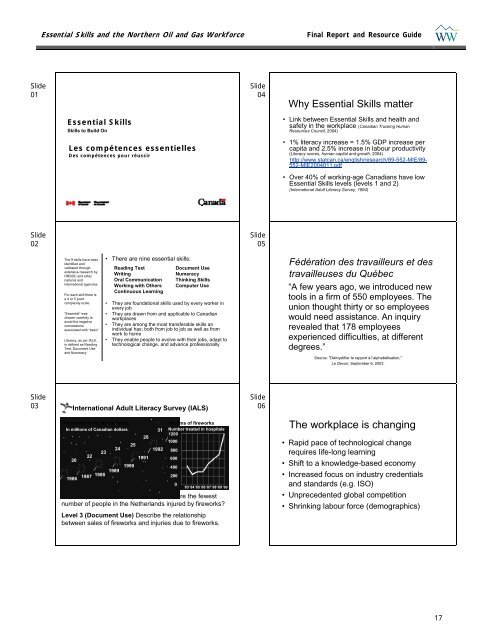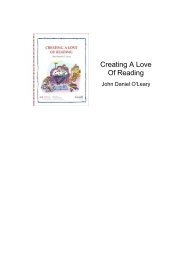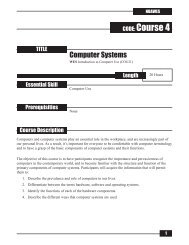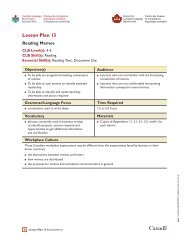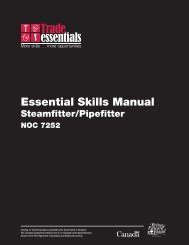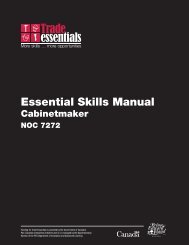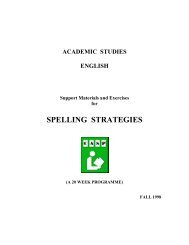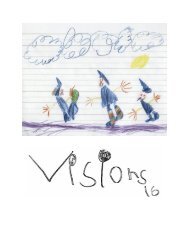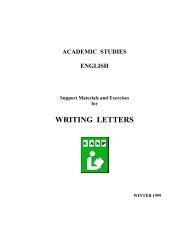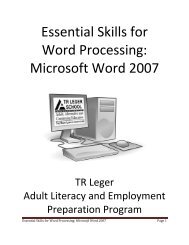Essential Skills - National Adult Literacy Database
Essential Skills - National Adult Literacy Database
Essential Skills - National Adult Literacy Database
Create successful ePaper yourself
Turn your PDF publications into a flip-book with our unique Google optimized e-Paper software.
Slide<br />
01<br />
<strong>Essential</strong> <strong>Skills</strong> and the Northern Oil and Gas Workforce Final Report and Resource Guide<br />
<strong>Essential</strong> <strong>Skills</strong><br />
<strong>Skills</strong> to Build On<br />
Les compétences essentielles<br />
Des compétences pour réussir<br />
Slide<br />
02 What are essential skills?<br />
The 9 skills have been<br />
identified and<br />
validated through<br />
extensive research by<br />
HRSDC and other<br />
national and<br />
international agencies<br />
For each skill there is<br />
a 4 or 5 point<br />
complexity scale<br />
“<strong>Essential</strong>” was<br />
chosen carefully to<br />
avoid the negative<br />
connotations<br />
associated with “basic”<br />
<strong>Literacy</strong>, as per IALS,<br />
is defined as Reading<br />
Text, Document Use<br />
and Numeracy<br />
• There are nine essential skills:<br />
Reading Text Document Use<br />
Writing Numeracy<br />
Oral Communication Thinking <strong>Skills</strong><br />
Working with Others<br />
Continuous Learning<br />
Computer Use<br />
• They are foundational skills used by every worker in<br />
every job<br />
• They are drawn from and applicable to Canadian<br />
workplaces<br />
• They are among the most transferable skills an<br />
individual has; both from job to job as well as from<br />
work to home<br />
• They enable people to evolve with their jobs, adapt to<br />
technological change, and advance professionally<br />
Slide<br />
03 International <strong>Adult</strong> <strong>Literacy</strong> Survey (IALS)<br />
Fireworks in the Netherlands Victims of fireworks<br />
Number treated in hospitals<br />
In millions of Canadian dollars<br />
31 Number<br />
1200<br />
treated in hospitals<br />
1200<br />
28 1000<br />
1000<br />
25<br />
24<br />
1992<br />
800<br />
800<br />
23<br />
22<br />
600<br />
1991<br />
20<br />
600<br />
1990<br />
400<br />
400<br />
1989<br />
200<br />
1987 1988 200<br />
1986<br />
0 ’83 ’84 ’85 ’86 ’87 ’88 ’89 ’90<br />
’83 ’84 ’85 ’86 ’87 ’88 ’89 ’90<br />
Level 2 (Document Use) In what year were the fewest<br />
number of people in the Netherlands injured by fireworks?<br />
Level 3 (Document Use) Describe the relationship<br />
between sales of fireworks and injuries due to fireworks.<br />
Slide<br />
04<br />
Slide<br />
05<br />
Slide<br />
06<br />
Why <strong>Essential</strong> <strong>Skills</strong> matter<br />
• Link between <strong>Essential</strong> <strong>Skills</strong> and health and<br />
safety in the workplace (Canadian Trucking Human<br />
Resources Council, 2004)<br />
• 1% literacy increase = 1.5% GDP increase per<br />
capita and 2.5% increase in labour productivity<br />
(<strong>Literacy</strong> scores, human capital and growth, 2004)<br />
http://www.statcan.ca/english/research/89-552-MIE/89-<br />
552-MIE2004011.pdf<br />
• Over 40% of working-age Canadians have low<br />
<strong>Essential</strong> <strong>Skills</strong> levels (levels 1 and 2)<br />
(International <strong>Adult</strong> <strong>Literacy</strong> Survey, 1994)<br />
Fédération des travailleurs et des<br />
travailleuses du Québec<br />
“A few years ago, we introduced new<br />
tools in a firm of 550 employees. The<br />
union thought thirty or so employees<br />
would need assistance. An inquiry<br />
revealed that 178 employees<br />
experienced difficulties, at different<br />
degrees.”<br />
Source: "Démystifier le rapport à l’alphabétisation,"<br />
Le Devoir, September 6, 2003.<br />
The workplace is changing<br />
• Rapid pace of technological change<br />
requires life-long learning<br />
• Shift to a knowledge-based economy<br />
• Increased focus on industry credentials<br />
and standards (e.g. ISO)<br />
• Unprecedented global competition<br />
• Shrinking labour force (demographics)<br />
W W<br />
17


